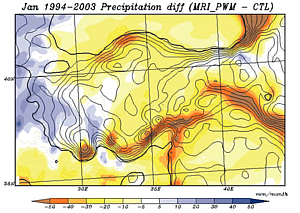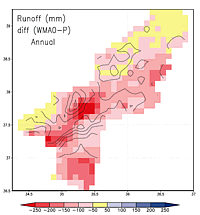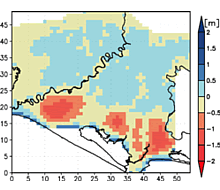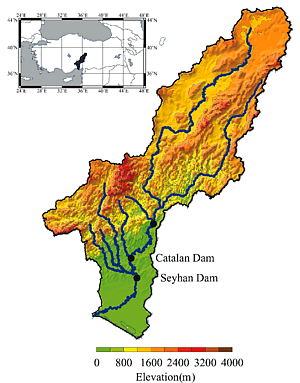Impact of Climate Changes on Agricultural Production System in the Arid Areas
This research project aimed at identifying the direction and dimensions of the potential impacts of climate changes and ensuing adaptations in the agricultural production systems of arid regions, where water resources are limited, based on the projection of future regional climate changes on the eastern coast of the Mediterranean Sea, the case study region. While the relationship between climate and agriculture in the past and present was analyzed, the impacts of climate changes, including rise in air temperature, decrease in precipitation and sea-level rise, on agricultural production systems were assessed. The project was implemented as an international joint project in cooperation with the Scientific and Technological Research Council of Turkey.
Summary of Research Outcomes
Climate change in the 2070s in the Seyhan River Basin was projected by using the latest climate model, and impacts of climate change on the condition of the river basin and agricultural production were assessed through generated climate change scenarios. The state-of-the-art GCMs and pseudo global warming experiments for the 2070s project temperature increase by 2○ to 3.5○ in all seasons and precipitation decrease by about 20% except for the summer season.
Field experiments and crop models proved that in the future there could be the regions both of increased yield and decreased yield of wheat, since wheat yield may increase with raised air temperature and CO2 concentration, while it may decrease with less precipitation. Natural vegetation also would be affected and the areas of steppe and evergreen broad-leaved forest might increase in the 2070s while sub-alpine plant area would decrease. Decreases in snow and rainfall will reduce available water resources. The expansion of vegetables and fruits of highly profitable crops and the irrigated area might result in water shortage and less yield in the irrigated area.
The projections and predictions are the discussions, which could be recognized as a sort of inference experiment based on the probable conditions and available information. An adaptive management approach is to be essential in the future against the global warming.
Contribution to Better Solutions for Global Environment Problems
Climate change due to global warming will affect the natural conditions for agriculture like land and water resources and consequently impacts agricultural production. With these impacts, humans may act to adapt to the changes or to mitigate the damage caused by climate change. These human reactions may result in other changes in the environmental problems. Therefore, for better solutions to the problems, it is essential to understand and project the impacts of climate change on agricultural production, and to let local knowledge and systems react to the changes. In this project, a method to diagnose the problems of land and water use and identify the crucial points was developed. In Turkey, where the case study area was located, the project provided the opportunity to establish new research organizations and a cross-disciplinary approach to the problem, and promoted enhanced consciousness of the importance of impact assessment of global warming on basin hydrology and agriculture.
Disseminations of the Project Outcomes
The project outcomes are distributed through books, lectures, and reports inside and outside of Japan. Many scientific papers are published in academic journals and presented in international conferences. The report in Turkish language was published. In Turkey, the international symposium was held toward sustainable agriculture, and the project outcomes were broadcasted on TV programs. The outcomes contributes to tackling with global warming disseminating the developed methodology and results to the international organizations such as ICID, International Committee on Irrigation and Drainage.
 |  |
 |
 |
Figure Annual Withdrawal to Availability Ratio The research for this project was implemented in the Seyhan River Basin (about 25,000km2) in the eastern Mediterranean region of Turkey as a main case study area. In the upper hilly area of the basin, rain fed wheat production is widespread and large scale irrigated agriculture producing maize, wheat, cotton, citrus etc. extends throughout the lower plain, which depends on the water supply from the reservoirs that receive run-off of winter precipitation in upper mountainous areas. The climate scenarios for the 2070s were generated by using the developed local climate model. (Top-left: an example of the future precipitation change in January. Blue shows increases and brown shows decreases), The basin model predicted the future changes of the hydrological regime along with the climate scenarios. (Top-center: predicted changes in annual runoff yield. Blue shows increases and red shows decreases). The future crop growth and water balance in the farmland were predicted based on these conditions. (Top-right: change of average groundwater table in the lower basin. Blue shows future rise and red shows decline). |
|

